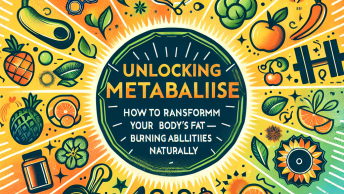Unlocking the Mysteries of Metabolism: 10 Fascinating Facts You Need to Know
Metabolism often gets a bad reputation whenever discussions about weight loss surface, but it’s much more than just a scapegoat for slow weight loss. It’s a complex biological process that powers every cell in our bodies. Whether you’re a fitness enthusiast, a science geek, or just someone who likes knowing how your body functions, understanding metabolism is essential. Here are ten intriguing facts about metabolism that might just change how you view this vital bodily function.
1. Metabolism is Not Just About Weight
When people talk about metabolism, it’s usually in the context of weight loss or gain, but metabolism is about much more than that. It refers to every chemical reaction happening in your body to sustain life—everything from breathing to repairing cells. Our bodies rely on metabolism to convert food into energy, making it integral to our very existence.
2. BMR: The Unsung Hero
Your Basal Metabolic Rate (BMR) accounts for about 60-75% of the calories you burn daily. BMR is the number of calories your body needs to perform essential functions, such as breathing, circulation, and cell production. Many believe their metabolism is purely dictated by their genes, but you can boost your BMR through muscle-building exercises and maintaining a healthy lifestyle.
3. Factors That Affect Metabolism
A myriad of factors can affect your metabolism, including age, muscle mass, body size, gender, and even genetics. Typically, men have higher metabolic rates than women because they usually have more muscle mass. As you age, your metabolism may slow down due to muscle loss, which is why maintaining an active lifestyle is crucial.
4. The Role of Muscle Mass
One frequently asked question is: Why does muscle mass increase metabolism? Muscle tissue requires more energy to maintain than fat, so individuals with more muscle mass tend to have a faster metabolism. Strength training exercises can help build and maintain muscle, which in turn keeps your metabolism revved up.
5. Thermogenesis
Thermogenesis is the process by which your body burns calories to produce heat. This can happen through exercise or non-exercise activities, such as fidgeting and even digestion. The thermic effect of food indicates that your body burns calories as it digests and processes what you eat. Interestingly, protein has a higher thermic effect compared to fats and carbohydrates, leading to greater calorie burn.
6. Foods That Could Boost Metabolism
Certain foods are believed to increase metabolism. These include protein-rich foods, chili peppers, green tea, coffee, and ginger. These foods can temporarily enhance your metabolic rate, although they shouldn’t be counted upon as a singular solution for weight management. Incorporating a balanced diet is key to promoting a healthy metabolism.
7. Metabolic Adaptation: A Two-Edged Sword
Metabolic adaptation can either be your ally or your foe. When you consume fewer calories, your metabolism slows down to conserve energy—this is a survival mechanism from our ancestors’ days. However, this adaptation often makes it difficult to lose weight consistently on a calorie-restricted diet.
8. Hydration and Metabolism
Drinking water can temporarily boost your metabolism. Studies have indicated that drinking water increases resting metabolism by about 10-30% for up to an hour. Cold water is even more effective because your body uses energy to heat the water to body temperature, further increasing calorie burn.
9. Sleep Deprivation Can Slow Metabolism
Never underestimate the power of a good night’s sleep. Sleep deprivation can disrupt your body’s ability to metabolize glucose and process carbohydrates effectively, leading to increased cravings and weight gain. Proper rest is essential not only for resetting your brain but also for optimal metabolic functions.
10. Metabolism: More Than Just Speed
People often refer to metabolism as ‘fast’ or ‘slow,’ but this simplifies a much more complex system. Rather than focusing solely on speed, it’s crucial to understand the efficiency with which your body uses energy. A balanced lifestyle, including diet, exercise, and sleep, plays a vital role in maintaining effective metabolic functioning.
Understanding metabolism is an ever-evolving journey, and increasing your knowledge can lead you to make more informed choices about your health and wellness. If you’re interested in diving deeper into how you can optimize your metabolism, consider exploring further resources and tips. Click Here to learn more about enhancing your metabolic rate and overall wellness.
In conclusion, metabolism is an essential bodily function that goes beyond just helping you lose or gain weight. It’s a reflection of how efficiently your body uses energy to keep you alive and well. With the right knowledge and lifestyle choices, you can positively influence your metabolism and live a healthier, more energetic life.






